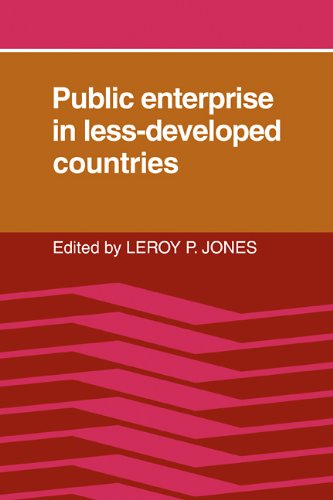

Most ebook files are in PDF format, so you can easily read them using various software such as Foxit Reader or directly on the Google Chrome browser.
Some ebook files are released by publishers in other formats such as .awz, .mobi, .epub, .fb2, etc. You may need to install specific software to read these formats on mobile/PC, such as Calibre.
Please read the tutorial at this link: https://ebookbell.com/faq
We offer FREE conversion to the popular formats you request; however, this may take some time. Therefore, right after payment, please email us, and we will try to provide the service as quickly as possible.
For some exceptional file formats or broken links (if any), please refrain from opening any disputes. Instead, email us first, and we will try to assist within a maximum of 6 hours.
EbookBell Team

0.0
0 reviews
ISBN 10: 052110291X
ISBN 13: 9780521102919
Author: Leroy P Jones
1. Introduction
Are public enterprises a useful unit of observation?
What determines the size and structure of the public-enterprise sector?
Principal-agent relationships: Who should control public enterprises?
How are decisions made in practice?
How do public enterprises behave in international markets?
How do public-enterprise managers respond to risk?
How are incentive systems to be designed?
How does public enterprise compare with other intervention mechanisms?
Part I: Why Public Enterprise?
Role of economic factors in determining the size and structure of the public-enterprise sector in less-developed countries with mixed economies
Leroy P. Jones and Edward S. Mason
Introduction
Evidence on size and structure
Benefits and costs of public enterprise in an optimal economic order
Evidence on revealed institutional advantage of public enterprise
Conclusion
Political economy of public enterprise
Muzaffer Ahmad
Traditional economics versus political economy
Political economy: an alternative approach
The nature of the contending social forces
Evolution of social forces in the colonial period
Categories of public enterprise in dominant-subordinate countries
Stability of public-enterprise regimes
Conflict within the public-enterprise sector
Generation and distribution of surplus
Part II: Principal-Agent Relationships: Who Should Control Public Enterprise?
State-owned enterprise: An agent without a principal
Yair Aharoni
Introduction
The principal-agent problem
State-owned enterprises as agents
The role of government as principal
Implications for management and performance
Public enterprise and the principal-agent problem
Edward S. Mason
Theoretical framework
Application to public enterprises
Case studies and examples
Policy implications
Part III: Performance and Evaluation
Performance of public enterprises in developing countries
Richard D. Mallon
Criteria for performance evaluation
Methodologies and approaches
Findings from case studies
Recommendations for improvement
Comparative performance of public and private enterprises
Paul N. Rosenstein-Rodan
Theoretical considerations
Empirical evidence
Factors influencing performance
Policy recommendations
Conclusion
Summary and policy implications
Raymond Vernon
Key findings
Implications for policy and practice
Directions for future research
public enterprise definition
public enterprise in other countries
a developed country is one that
allows private enterprise but only on a very limited basis
in freeenterprise systems around the world there are quizlet
a freeenterprise economy
Tags: Leroy P Jones, Enterprise, Countries